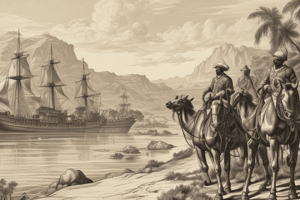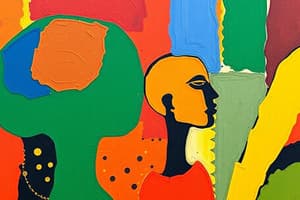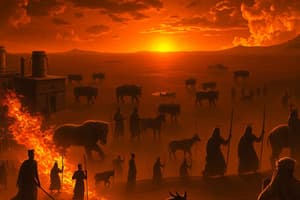Podcast
Questions and Answers
What triggered the European competition for African territories in the late 19th century?
What triggered the European competition for African territories in the late 19th century?
- The Berlin Conference (1884-85) (correct)
- The fall of the Ottoman Empire
- The discovery of gold in South Africa
- The rise of Pan-Africanism
What was a major motivation for European powers to engage in the Scramble for Africa?
What was a major motivation for European powers to engage in the Scramble for Africa?
- To access natural resources and markets (correct)
- To promote economic development in Africa
- To spread Christianity
- To establish democratic governments
What was a consequence of the Scramble for Africa?
What was a consequence of the Scramble for Africa?
- The creation of a united African state
- The eradication of diseases
- The establishment of democratic governments
- Artificial boundaries and fragmented territories (correct)
What was a mechanism of economic exploitation used by European powers?
What was a mechanism of economic exploitation used by European powers?
What was a consequence of cultural imperialism in Africa?
What was a consequence of cultural imperialism in Africa?
What was a form of African resistance to colonialism?
What was a form of African resistance to colonialism?
Who was a key figure in Ghana's independence movement?
Who was a key figure in Ghana's independence movement?
What was a consequence of resistance and independence movements in Africa?
What was a consequence of resistance and independence movements in Africa?
What is a legacy of colonialism and neo-colonialism in modern Africa?
What is a legacy of colonialism and neo-colonialism in modern Africa?
What was a type of economy developed in Africa during the colonial period?
What was a type of economy developed in Africa during the colonial period?
Study Notes
Scramble for Africa
- Late 19th century European competition for African territories
- Triggered by Berlin Conference (1884-85) where European powers divided Africa into spheres of influence
- European powers:
- Britain, France, Germany, Belgium, Italy, Portugal, and Spain
- Motivations:
- Economic: access to natural resources and markets
- Strategic: securing strategic locations and trade routes
- Prestige: expanding colonial empires and national pride
- Consequences:
- Artificial boundaries and fragmented territories
- Disregard for existing African societies and polities
- Forced assimilation and suppression of indigenous cultures
Economic Exploitation
- European powers exploited Africa's natural resources:
- Minerals (gold, diamonds, copper, etc.)
- Agricultural products (cotton, rubber, palm oil, etc.)
- Mechanisms of exploitation:
- Forced labor and slavery
- Unequal trade agreements and tariffs
- Extraction of resources without investment in local development
- Economic structures:
- Plantation economies (e.g., cotton, rubber)
- Mining industries (e.g., diamonds, gold)
- Infrastructure development (e.g., railways, ports) for European benefit
Cultural Imperialism
- European powers imposed their cultural values and practices on African societies:
- Forced conversion to Christianity
- Suppression of traditional practices and beliefs
- Promotion of European languages and education systems
- Consequences:
- Erosion of traditional African cultures and identities
- Creation of cultural hybrids and contradictions
- Internalized oppression and self-doubt among Africans
Resistance and Independence Movements
- African responses to colonialism:
- Armed resistance (e.g., Mahdist State, Zulu Kingdom)
- Non-violent resistance (e.g., Ghana's independence movement)
- Nationalist movements (e.g., Pan-Africanism)
- Key figures:
- Kwame Nkrumah (Ghana)
- Julius Nyerere (Tanzania)
- Patrice Lumumba (Congo)
- Consequences:
- Gradual independence of African countries (1950s-1960s)
- Ongoing struggles for true independence and self-determination
- Legacy of colonialism and neo-colonialism in modern Africa
Studying That Suits You
Use AI to generate personalized quizzes and flashcards to suit your learning preferences.
Description
This quiz covers the European colonization of Africa, including the Scramble for Africa, economic exploitation, cultural imperialism, and African resistance and independence movements.




